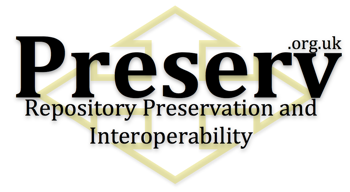
Latest...
 | Preserv 2 final report 'candid and realistic' |
The final report from the Preserv 2 project has been described by the JISC programme manager responsible for funding the project, Neil Grindley, as ”candid and realistic about the ... more |
|
Project Partners
Project Advisors

|
Funded By

|
PRESERV 2 is funded by JISC within its capital programme in response to the September 06 call (Circular 04/06), Repositories and Preservation strand
PRESERV was originally funded by JISC within the 4/04 programme
Supporting Digital Preservation and Asset Management in Institutions, theme 3: Institutional repository infrastructure development
MORE INFORMATION?
EMAIL: Steve Hitchcock, Project
Manager
TEL: +44 (0)23 8059 3256
FAX: +44 (0)23 8059 2865
PRESERV Project,
IAM (Intelligence, Agents, Multimedia) Group,
Department of Electronics & Computer Science,
University of Southampton,
Highfield,
Southampton
SO17 1BJ, UK
|
|
An Updated version of this page is coming soon
| Plan |
Outcomes |
- Implement an ingest service based on the OAIS reference model for institutional archives built using EPrints software. EPrints is the most widely used software for building institutional archives. EPrints is developed at Southampton University and is used by over 190 archives in all regions of the world.
- Adapt EPrints software to allow the collection and dissemination of preservation-oriented metadata to supplement the current bibliographic information.
|
- The project identified a cost-oriented hierarchical series of preservation service models, and applied PREMIS to the core model to identify the sources of the preservation metadata needed to provide the services.
- An eprint audit history module has been added in EPrints v3.0 to support preservation applications by storing version details and recording actions on local objects.
|
- Working with the National Archives, the project will link EPrints to PRONOM software for identification and verification of file formats.
- This ingest service will be integrated into the EPrints deposit process for two existing institutional archives, at Southampton and Oxford Universities for evaluation, subject to prior satisfactory testing on pilot archives.
|
- After applying PRONOM to the two pilot repositories, a more productive repository test environment, in terms of the number of repositories covered, was found: Registry of Open Access Repositories (ROAR). ROAR is an OAI-based harvesting service.
- PRONOM-ROAR: integrating PRONOM with the harvesting service for ROAR produced Preserv profiles - file format profiles for stored objects - for over 200 repositories. Accurate knowledge of file formats is a pre-requisite for preservation planning and active preservation.
|
- Consult with stakeholder communities.
|
- Based on the preservation metadata analysis, repository managers were presented with Preserv profiles and asked about preservation policy and activity. A potentially alarming divergence was uncovered between formal preservation policy and unrecorded repository activity with preservation consequences. Preliminary survey results (from slide 9).
|
- The British Library and Southampton University will build and test an exemplar OAI-based preservation service. This service could be used with any OAI-compatible preservation archive to create a software-independent preservation archive.
|
- PRONOM-ROAR suggests a new perspective. If preservation can begin with a service that freely interacts with hundreds of repositories, why not a series of distributed Web-based services, offering characterisation, preservation planning and active preservation? This involves not just technical evaluation and testing, but also market evaluation in a market that is itself seeking guidance and, judging from the repository survey, is already making well-intentioned but possibly detrimental ad hoc decisions to handle preservation.
|
|
|
Summary: Preserv began as an EPrints-PRONOM focussed project with a view towards large, black-box service providers, and ends with a quite different perspective of more generic repository harvesting interfaces allied to a series of lightweight, interacting Web-based preservation services providing choice, flexibility and cost-effectiveness.
|
| Our sister site EPrints.org offers a focal point for support services, community building, news and information on OAI-based open-access institutional repositories. |
|
|









